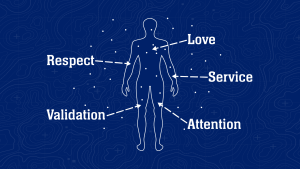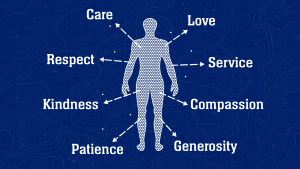Only the weak are cruel. Gentleness can only be expected from the strong. – Leo Buscaglia
The other day, my wife Lynn and I were walking through a parking lot. As we came to a place where we needed to turn to get to our car, Lynn continued walking straight. “Honey” I said. “Our car’s not that way. We need to turn here.”
Since you’re reading these words and not listening to them, you probably don’t see anything wrong with my statement. I used the affectionate term “honey” and simply stated the directions. There was no name calling, personal attack, or put-down.
But if you heard me say it, you’d likely come to a different conclusion—that I sounded terse and irritated. There was no gentleness in my voice, even though my words themselves were harmless. My wife immediately picked up on my aggravation.
For those of us working to stop behavior that damages our relationships (emotional abuse), eliminating hurtful or manipulative words is essential. However, we also must look at our delivery—our non-verbal communication. Are we saying things with gentleness, or with an edge?
The essence of gentleness
Gentleness is being kind, tender, and considerate in our interactions with others. It involves treating them with patience, compassion, respect, and understanding. Gentle people are not easily angered or upset. They intentionally avoid causing others distress.
Here are some examples of gentleness:
- A parent who speaks to their child in a calm and patient voice, even when he or she is misbehaving.
- The wife who listens to her husband without judgment, even when he is sharing something difficult.
- A teacher who is patient and understanding with their students, even when they are struggling to learn.
- The man who redirects his partner to their automobile by saying, in a soft voice, “Hey honey. I think the car is this way.”
Why gentleness matters
When confronted with my lack of gentleness, I remember thinking, Oh good grief! I’m not hitting anyone, calling them names, or putting them down. How far do I need to go in changing my behavior? Maybe you’re thinking, like I was, that people should just toughen up and not be so sensitive.
That, my friend, is dead-end thinking. We could debate all day whether speaking tersely is or is not abuse, but it’s a pointless argument. When we ask the question, “Is my lack of gentleness helpful in maintaining a close, loving relationship?” the answer is obviously no. Why then, would I not want become more gentle?
Gentleness promotes harmony, understanding, and empathy in relationships. It fosters an atmosphere of trust, safety, and emotional well-being, allowing for deeper, stronger bonds with others. Anger and frustration, on the other hand, only create fear, resentment, and defensiveness in them.
People are drawn to kindness and understanding. In other words, they will naturally like us more. It’s not just true in intimate relationships; it’s true in just about every area of life.
Good salespeople know that most customers buy something because they trust the person recommending it. That trust is built by gently building rapport and is far more persuasive than a loud sales pitch. The same goes for leadership, parenting, friendships, and interacting with strangers. Gentleness is nearly always the winning approach.
Becoming more gentle
If you, like me, need to work on your gentleness, telling you to be gentler in your interactions is not going to work. You’ll remember it for a while, but are likely all too often to revert to being snippy. Getting to the heart of our grumpiness is key.
There are various temporary reasons why we may lack gentleness: stress, fatigue, hunger, our environment, and difficult personal circumstances to name a few. Of course, take care of yourself and address these issues if that’s the source. However, if our irritability is a persistent pattern, we need to look deeper for the underlying cause.
Operating with a sense of fullness
It’s hard to be empathetic, patient, and kind to others when we’re not feeling like we’ve received those things ourselves. I’m not suggesting we try to force others into treating us better—that tactic will definitely backfire. Sure, we may need to set boundaries and limit our interaction with some particularly toxic people.
Mostly, however, we’ll need to change our self-talk and give ourselves the compassion we’ve been missing. When we’re operating with a sense of fullness—a belief we have been well-cared for and have all our needs met—we treat others differently. Gentleness begins with how we feel about ourselves.


It’s like showing up at a buffet restaurant when you’ve just come from a family potluck. You’re full, and you’re not there to consume. Even if the food is dry and tasteless, you don’t care because you don’t need anything from the table.
Getting this sense that “I have all I need” isn’t automatic. Regularly practicing gratitude helps. What blessings have you already been given? Focusing on the positives rather than the negatives sets our minds in an attitude of gratefulness rather than resentment.
Few people are born with a silver spoon in their mouth. All of us encounter challenges. Belief in a higher power, connecting yourself to a purpose greater than yourself, or seeking support from a counseling professional can also make a difference. It’s possible to switch our mindset from victim mentality to lottery winner without changing anything or anyone around us.
Faith note
The Bible is full of reminders about the benefits of gentleness. Here are a few:
- A gentle answer deflects anger,but harsh words make tempers flare.Proverbs 15:1
- Gentle speech breaks down rigid defenses. Proverbs 25:15
- Always be humble and gentle. Be patient with each other, making allowance for each other’s faults because of your love.Ephesians 4:2
- A servant of the Lord must not quarrel but must be kind to everyone, be able to teach, and be patient with difficult people. Gently instruct those who oppose the truth. 2 Timothy 2:24-25
- …they should be gentle and show true humility to everyone. Titus 3:2
Gentleness is a mark of spiritual maturity. It means that we have seen, and are grateful for, the many ways God has provided for us. We trust that God will continue to take care of us, too, so we don’t need to be anxious about the future.
Following Christ means we join him in his work. We attach ourselves to a greater purpose than just living for ourselves. It’s like working in a special position in the king’s court. Our jobs are secure, and the benefits are great!
Sensing God’s blessing and sharing his purpose is amazingly satisfying – we stop needing others to say or do anything. Our speech becomes more pleasant, positive, and gentle because we get all we need from our relationship with him.


Recent Comments